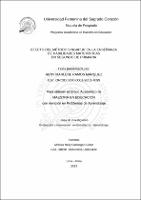Efecto del método Singapur en la enseñanza de habilidades matemáticas en segundo de primaria
Abstract
El presente estudio se ha realizado en un centro educativo parroquial ubicado en el distrito de Magdalena del Mar en la ciudad de Lima. Se inicia con la pregunta de investigación ¿Cuáles han sido las habilidades matemáticas del Método Singapur que han sido aplicadas por los estudiantes del segundo grado de primaria en el marco de una educación virtual por la emergencia sanitaria? El objetivo general es determinar las habilidades matemáticas del Método Singapur que han sido aplicadas por los estudiantes del segundo grado de primaria en el marco de una educación virtual por la emergencia sanitaria. La metodología utilizada en la investigación tiene un enfoque cualitativo, de tipo descriptivo y recogen algunos elementos de tipo etnográfico porque se utiliza la observación para la interpretación de las acciones del objeto de estudio. Los informantes lo conforman 23 niños y 9 niñas de segundo grado de primaria. La técnica empleada fue la ficha de observación y para el vaciado de los hallazgos se construyó una matriz de recojo de la información. Los resultados se obtuvieron a partir de la observación de las sesiones grabadas del curso de matemática durante las clases sincrónicas. Se concluye que los estudiantes aplican las habilidades matemáticas adquiridas el año anterior durante las clases regulares a través del Método Singapur y que ahora les permite afrontar sus aprendizajes con algunas limitaciones tecnológicos, desarrollando su lenguaje matemático para expresar el proceso mental que realiza para resolver una operación o una situación problemática. This study has been carried out in a parochial aducational center located in the district of Magdalena del Mar in the city of Lima. It begins with the research question: What have been the mathematical skills of the Singapore Method that have been applied by the students of the second grade of primary school in the framework of a virtual education due to the health emergency? The general objetive is to determinbe the mathematical skills of the Singapore Method that have been spplied by students in the second grade of primary school in the framework of a virtual education due to the health emergency. The methodology used in the research has a qualitative, descriptive approach and some ethnographic elements are collected because observation is used to interpret the actions of the object of study. The informants are made up of 23 boys and 9 girls from second grade from Elementary school. The technique used was the observation sheet and for the emptying of the findings an information collection matrix was constructed. The results were obtained from the observation of the recorded sessions of the mathematics course during the synchronous classes. It is concluded that students apply the mathematical skill acquired the previous year during regular classes through the Singapore Method and that now it allows them to face their learning with some technological limitations, developing their mathematical languaje to express the mental process they perform to solve an operation or a troublesome situation.
Description
Tesis Evaluación e Intervención en Enseñanza - Aprendizaje


